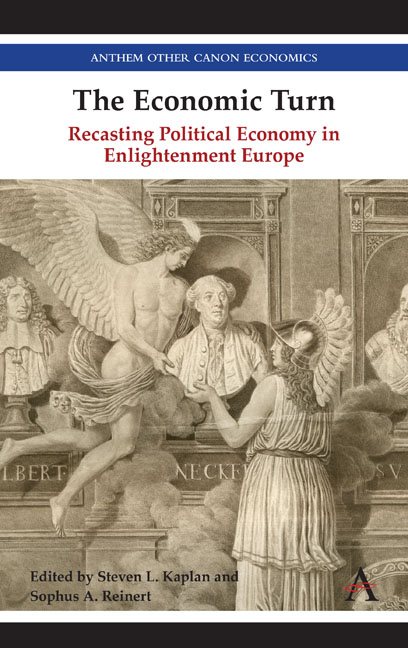Book contents
- Frontmatter
- Contents
- Acknowledgments
- Notes on Contributors
- Chapter One The Economic Turn in Enlightenment Europe
- Chapter Two The Physiocratic Movement: A Revision
- Chapter Three The Political Economy of Colonization: From Composite Monarchy to Nation
- Chapter Four Against the Chinese Model: The Debate on Cultural Facts and Physiocratic Epistemology
- Chapter Five “Le superflu, chose très nécessaire”: Physiocracy and Its Discontents in the Eighteenth-Century Luxury Debate
- Chapter Six François Véron de Forbonnais and the Invention of Antiphysiocracy
- Chapter Seven Between Mercantilism and Physiocracy: Forbonnais's ‘Est modus in Rebus’ Vision
- Chapter Eight Physiocrat Arithmetic versus Ratios: The Analytical Economics of Jean-Joseph-Louis Graslin
- Chapter Nine Galiani: Grain and Governance
- Chapter Ten “Live and Die Proprietors and Free”: Morellet Dismantles the Dialogues and Defends the Radical Liberal Break
- Chapter Eleven “Is the Feeling of Humanity not More Sacred than The Right of Property?”: Diderot's Antiphysiocracy in His Apology of Abbé Galiani
- Chapter Twelve De facto Policies and Intellectual Agendas of an Eighteenth-Century Milanese Agricultural Academy: Physiocratic Resonances in the Società patriotica
- Chapter Thirteen Sensationism, Modern Natural Law and the “Science of Commerce” at the Heart of the Controversy between Mably and the Physiocrats
- Chapter Fourteen ‘One Must Make War on the Lunatics’: The Physiocrats’ Attacks on Linguet, the Iconoclast (1767–1775)
- Chapter Fifteen The Grain Question as the Social Question: Necker's Antiphysiocracy
- Chapter Sixteen Physiocracy in Sweden: A Note on the Problem of Inventing Tradition
- Chapter Seventeen Spain and the Economic Work of Jacques Accarias de Serionne
- Chapter Eighteen Captured by the Commercial Paradigm: Physiocracy Going Dutch
- Chapter Nineteen Cameralism, Physiocracy and Antiphysiocracy in the Germanies
- Chapter Twenty No Way Back to Quesnay: Say's Opposition to Physiocracy
- Chapter Twenty-One “A Sublimely Stupid Idea”: Physiocracy in Italy from the Enlightenment to Fascism
- Chapter Twenty-Two Epilogue: Political Economy and the Social
- Index
Contents
Published online by Cambridge University Press: 12 February 2019
- Frontmatter
- Contents
- Acknowledgments
- Notes on Contributors
- Chapter One The Economic Turn in Enlightenment Europe
- Chapter Two The Physiocratic Movement: A Revision
- Chapter Three The Political Economy of Colonization: From Composite Monarchy to Nation
- Chapter Four Against the Chinese Model: The Debate on Cultural Facts and Physiocratic Epistemology
- Chapter Five “Le superflu, chose très nécessaire”: Physiocracy and Its Discontents in the Eighteenth-Century Luxury Debate
- Chapter Six François Véron de Forbonnais and the Invention of Antiphysiocracy
- Chapter Seven Between Mercantilism and Physiocracy: Forbonnais's ‘Est modus in Rebus’ Vision
- Chapter Eight Physiocrat Arithmetic versus Ratios: The Analytical Economics of Jean-Joseph-Louis Graslin
- Chapter Nine Galiani: Grain and Governance
- Chapter Ten “Live and Die Proprietors and Free”: Morellet Dismantles the Dialogues and Defends the Radical Liberal Break
- Chapter Eleven “Is the Feeling of Humanity not More Sacred than The Right of Property?”: Diderot's Antiphysiocracy in His Apology of Abbé Galiani
- Chapter Twelve De facto Policies and Intellectual Agendas of an Eighteenth-Century Milanese Agricultural Academy: Physiocratic Resonances in the Società patriotica
- Chapter Thirteen Sensationism, Modern Natural Law and the “Science of Commerce” at the Heart of the Controversy between Mably and the Physiocrats
- Chapter Fourteen ‘One Must Make War on the Lunatics’: The Physiocrats’ Attacks on Linguet, the Iconoclast (1767–1775)
- Chapter Fifteen The Grain Question as the Social Question: Necker's Antiphysiocracy
- Chapter Sixteen Physiocracy in Sweden: A Note on the Problem of Inventing Tradition
- Chapter Seventeen Spain and the Economic Work of Jacques Accarias de Serionne
- Chapter Eighteen Captured by the Commercial Paradigm: Physiocracy Going Dutch
- Chapter Nineteen Cameralism, Physiocracy and Antiphysiocracy in the Germanies
- Chapter Twenty No Way Back to Quesnay: Say's Opposition to Physiocracy
- Chapter Twenty-One “A Sublimely Stupid Idea”: Physiocracy in Italy from the Enlightenment to Fascism
- Chapter Twenty-Two Epilogue: Political Economy and the Social
- Index
- Type
- Chapter
- Information
- The Economic TurnRecasting Political Economy in Enlightenment Europe, pp. v - viPublisher: Anthem PressPrint publication year: 2019

